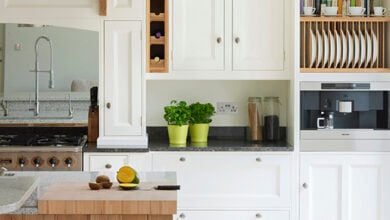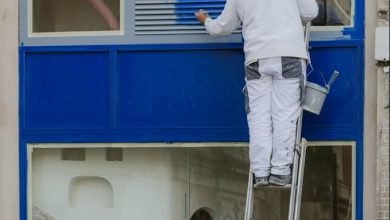Gas is a dangerous substance, and whilst we couldn’t do without gas appliances like boilers, gas fires and cookers in our homes, all gas appliances should be carefully maintained to avoid them becoming hazardous.
According to the Gas Safe Register, 1 in 6 homes inspected by engineers contain unsafe gas appliances. Keeping up-to-date with the maintenance of your gas appliances is essential to the safety of your home and everyone living there.
When things go wrong, gas can leak out of appliances and cause fire, explosions or carbon monoxide poisoning. To avoid dangerous gas leaks, all gas appliances should be fitted, maintained and serviced by qualified and Gas Safe registered professionals only.

Top tips for a gas safe home
Whilst it’s important to have a professional tradesperson install and service your gas appliances, there are a number of checks you can make yourself and precautions you can take to make your home gas safe.
Know the warning signs of a problem
You and everyone else in your home should be aware of the warning signs that there may be a problem with a gas appliance. Identifying a problem early on can help to avert a disaster and may even be life-saving.
- Pilot light flame looks yellow rather than blue.
- Black soot marks on the appliance.
- Fumes or smoke coming from the appliance.
- Increased levels of condensation in the same room as the gas appliance.
- Pilot light frequently goes out.
- Appliance becomes unusually noisy.
Keep ventilation clear and unblocked
Ventilation for gas appliances can include chimney flues and air vents and bricks. Black soot marks appearing on an appliance can be a sign that the ventilation is blocked.
Properly fit a carbon monoxide detector
Carbon monoxide is a highly dangerous colourless and odourless gas, making it difficult to detect until it’s too late without a carbon monoxide detector. All homes containing gas appliances should have a detector, which can be bought from most DIY stores and are readily available to buy online. When choosing an alarm, make sure that it meets European safety standards.
Where to safely position your alarm
Your carbon monoxide alarm should be fitted in the same room as the gas appliance and located at least one metre away from it. The alarm should be positioned at head height and should not have anything obstructing it or be located near a source of ventilation or condensation (eg. a kettle).
Maintaining and testing the alarm
Your carbon monoxide alarm should have a ‘test’ button. Make sure that you make a habit of regularly testing your alarm to check that it is still working and the batteries do not need changing.
Don’t use any gas appliances if you’re not sure if they’re working properly
If there is any doubt in your mind about whether a gas appliance is working properly or not, then you should refrain from using it until it has been properly checked by a professional.
Have your gas appliances serviced by a registered professional annually
Every 12 months you should have your gas appliances safety checked by a Gas Safe registered engineer to ensure that they are operating efficiently and safely.
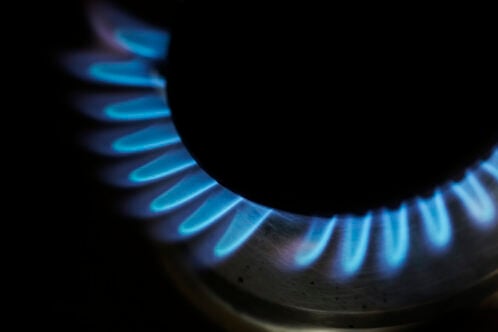
What to do if you smell gas
Smelling gas in your home can be alarming and should be dealt with immediately, so it’s important that everyone in your household is aware of the steps that should be taken in the event of a potential gas leak. Taking immediate action can help to avoid a potentially devastating situation.
- Evacuate the property immediately.
- Turn your gas supply off at the gas meter.
Make sure you and other householders are familiar with where your gas meter is and how to switch the supply off (if you can).
- Open all windows and doors
Disperse any gas that has collected in your home be letting fresh air flow through the property.
- Avoid using anything electrical
Whilst you’re airing your house, avoid using light switches or any electrical appliances in your home as sparks could ignite the gas and cause a fire or explosion.
- Call the National Gas Emergency number
The telephone number to call if you suspect a gas leak in your home is 0800 111 999. Make sure that you have the number saved in your phone or pinned up somewhere easy to locate in your home. If you’re calling on a mobile phone, make sure you go to a neighbour’s house or walk a safe distance from your home before using your phone, never use a mobile phone whilst still inside your house if you suspect a gas leak.
Signs and symptoms of carbon monoxide poisoning
If carbon monoxide is leaking out into your home this can be more difficult to detect as it is colourless and odourless. If you don’t have a carbon monoxide alarm or your alarm is not working properly, and carbon monoxide starts leaking into your home then you may start to experience some physical symptoms of carbon monoxide poisoning.
Symptoms include:
- Headache
- Light-headedness
- Dizziness
- Nausea
- Visual problems
- Drowsiness
Warning signs that there may be carbon monoxide leaking into the home are the same as the signs that there could be a problem with a gas appliance.
If you suspect that you or someone else may be suffering from carbon monoxide poisoning it is important to act fast to remove them from the property and get them outside in the fresh air before calling for medical help.
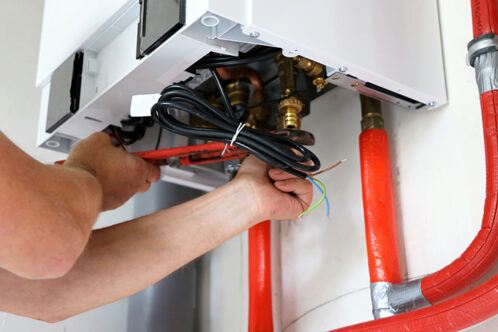
Getting your gas appliances checked or serviced
Safety check versus service – what’s the difference?
When having your gas appliances checked it’s important to understand the options available to you to ensure that you request the appropriate service from your engineer.
The first thing to work out is whether you require a safety check or service of one single appliance, a safety check for all appliances, or an entire installation.
The exact details of what is involved for each service will vary depending on the type and model of the appliance and the manufacturer’s instructions.
Generally, an appliance safety check will just ensure that the appliance is safe to use, whilst a service is more thorough and may include more specific checks as well as an inspection of the appliance’s condition and cleaning.
A full gas installation safety check should include inspection of all gas appliances as well as all accessible pipework.
Why are gas safety checks and services so important?
Most importantly, having your gas appliances safety checked annually will give you peace of mind that they are not putting you, your family, or your home in danger, and that they are safe to use. There are other benefits of regular safety checks and services as well though.
- Keeps appliances working efficiently.
- Catch any problems early on before they become more expensive to fix.
- Regular boiler servicing makes it less likely your boiler will pack in on you in the middle of winter.
- More efficient appliances mean money saved.
What happens during a service?
The exact details of what will happen during your gas service will vary depending on the appliance or installation being serviced. However, as a rough guide, most services will include the following:
- Check that the appliance is in full working order.
- Check that the appliance is operating safely.
- Inspection of the condition of the main components.
- Check the gas pressure.
- Check for corrosion or leaks.
- Cleaning of parts if needed.
As well as having your gas appliances serviced, it is advisable to have ventilation measures and flues cleaned and maintained on an annual basis.

Hiring a Gas Safe engineer
When dealing with a substance as dangerous as gas, you will want to ensure that any professionals fitting, maintaining, or servicing your appliances are experienced and qualified to do so to avoid problems going unnoticed or appliances being installed incorrectly.
Luckily, the Gas Safe Register makes it simple for everyone to gain access to a list of reputable, professional, and competent gas engineers in their local area.
All reputable gas engineers are listed on the Gas Safe register and carry a Gas Safe identification card, anyone working with gas appliances who is not registered with Gas Safe is breaking the law.
What is the Gas Safe Register?
The Gas Safe Register is the official gas registration and licensing body in the UK, Northern Ireland, Isle of Man and Guernsey. For anyone that remembers CORGI, the Gas Safe Register took over from CORGI in 2009.
You can rest assured that engineers listed on the Gas Safe Register have been required to provide evidence of their qualifications and experience to prove their technical competence. The work of registered engineers is also inspected regularly to ensure that they are meeting current standards and following best practice.
As well as coordinating and maintaining the Gas Safe Register and regulating the standard of work being carried out by registered engineers, Gas Safe also raise public awareness of gas safety and investigate illegal gas work that has been carried out.

Benefits of using a Gas Safe registered engineer?
When you hire an engineer from the Gas Safe Register you can do so with confidence that:
- They can legally and safely work with gas appliances.
- They are qualified and experienced.
- They are regularly inspected to ensure high standards of work.
- You will receive a full and thorough service or safety check.
What to look for when checking your gas engineer’s ID card
When the engineer arrives at your property, don’t be afraid to ask to see their Gas Safe ID card. The ID card carries useful information to help you check that the engineer is who they say they are and that they’re qualified to carry out the job you’ve hired them to do.
Here are a few things to check on their ID card:
- Name, photo and business they work for – are they the person you were expecting?
- Start and expiry date – this is important as Gas Safe membership needs to be renewed annually.
- Their licence number – you can check that the license number is valid on the Gas Safe website here.
- Security hologram – is it present and does it look genuine?
- Are they qualified to carry out the job? – on the back of the ID card it lists what type of work the engineer is qualified to do.
- Are their qualifications up to date?
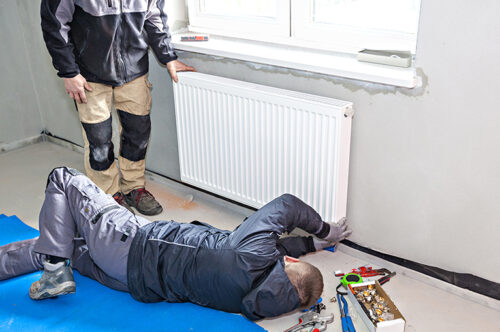
Gas safety for landlords/tenants
In the case of rented properties, it is the landlord’s responsibility to ensure that all gas appliances in a rental property that belong to them are properly maintained and have annual safety checks from Gas Safe registered engineers.
Landlords are required to arrange annual gas safety checks under the Gas Safety (Installation and Use) Regulations 1998 and if they fail to do so they are breaking the law.
According to the Health and Safety Executive, landlords are required to keep a record of each gas safety check for 2 years and supply each tenant with a copy of the Gas Safety Certificate within 28 days of the safety check being carried out.
You may sometimes hear a Gas Safety Certificate referred to as a CP12 certificate. CP12 is what the certificate was called back when CORGI regulated gas safety in the UK. The new Gas Safety Certificate is essentially the same thing under a new name.
Find a local Gas Safe engineer
Need help with a gas appliance in your home? Post your job on Rated People to receive quotes from up to four Gas Safe registered engineers local to you.



